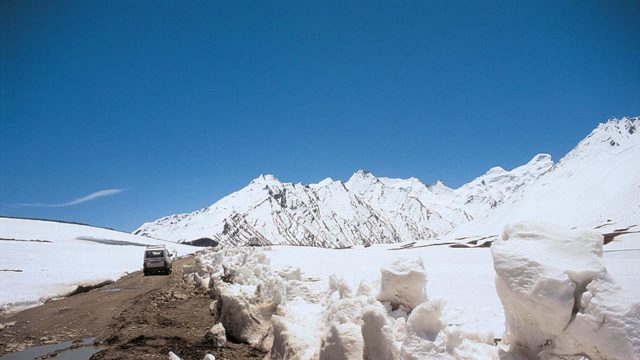Though it’s the Manali-to-Leh drive that’s most popular with tourists, the Ladakh region is dotted with many scenic roads that can turn into entire journeys by themselves. You could drive to the remote Zanskar Valley. In Zanskar, the trip from Sankoo to Kartse Khar is every bit worth the dirt track for a glimpse of the 1,200-year-old, 40-foot-high monolith statue of Maitreya Buddha, carved into a rock face of the valley.
The Nubra Valley too is an overnighter. The road climbs over a series of bends above Leh to Khardung La (18,380 ft), beyond which lie the freakish sand dunes of Nubra, along the less visited monasteries perched above the vast Nubra Valley basin.
Leh to Nubra Valley via Khardung La
This high pass, termed the highest motorable road in the world, attracts most visitors to Ladakh, if only for a photo-op at its famous milestone, a cup of hot chai, a snack at the army-run café here and some frolicking in the snow around. The short drive itself is lovely as it climbs over Leh via the Tsemo Gompa Road that veers over small villages. It slowly leaves the vast spread of the Leh Valley behind to make the final ascent to the pass beyond the army camp at South Pullu. Don’t miss the massive Khardung La frog carved off a single rock that sits on the roadside at a bend along the way. This pass is also the gateway to the beautiful Shyok and Nubra valleys, which makes for a great two-day sojourn where you can visit Samstaling (in Tigre village) and the Diskit gompas and stay at any of the several small guest houses in Sumur, Diskit or Hunder. The sand dunes of Nubra and its vast striated river basin make for a spectacular drive to the end of the valley at Panamik. Siachen starts here.

The Zanskar Drive
Keep a week for this remote part of Ladakh as it takes four days to merely get in and back from Leh and three to see the lovely valleys and gompas of Zanskar. The road from Leh itself is smooth. The Indus-Zanskar confluence,
a little ahead of Nimmu along the route, is worth a peek for the sheer variation in the colour of the two rivers. Magnetic Hill is a place where the layout of the surrounding land produces an optical illusion which makes a slight downhill slope look like an uphill slope. Thus, a car left out of gear will appear to be rolling uphill. The Leh Magnetic Hill is located on the Leh-Kargil-Batalik National Highway, about 30 km from Leh at a height of 13,123 ft.
For now, you’ve to head straight on the Upper Lamayuru route. The lower road goes via the bottom of the gorge, and though it’s a lovely route too, you’ll miss out the spectacular rock formations along the Upper Lamayuru route which epitomise Ladakh’s moonscape, with the Lamayuru Monastery enjoying a lovely perch in its midst. Ahead on the road, the Fotu La (13,605 ft) is followed by the Namika La (12,204 ft), where spectacular rounded hillsides along side the Muslim villages of the Suru Valley start to appear. At 230 km from Leh, Kargil makes an ideal stopover for the night, though more than a night in this rather uninspiring town. But for Zanskar, or for going ahead to Srinagar, it makes for an ideal night halt.
Till Kargil, the road is in reasonably good condition, with only intermittent bad patches, but from Kargil onwards, it won’t be an exaggeration to say the road – if you can call it that – barely exists. Almost the entire stretch is unsealed, with loose gravel making for an exceptionally bumpy and tiresome ride. It would take you 12
hrs to do the 234-km stretch and another 12 to relieve your bumped bodies off the stress.
Things to See & Do
The Drang-Drung Glacier is the largest glacier in Ladakh which falls along the road. Among the monasteries in Zanskar, which appear en route to Padum, the Rangdum Gompa, built in the 16th century, houses statues of the Buddha, Avalokiteshwara and Tsong khapa. Karsha Gompa is the largest and most important monastery in Zanskar and it lies 9 km from Padum. Sani lies 8 km from Padum in the valley flats, with imposing chortens and maniwalls surrounding it. To its rear is the Kanika Stupa, indicating a connection with Kanishka, the Kushan ruler of the 2nd century CE. Bardan Gompa is 12 km south of Padum and is a 17th-century monastery that lies perched atop a crag.
Where to Stay & Eat
At Kargil, Hotel D’Zojila (Tel: 01985-232227, Cell: 09419176212; Tariff: ₹4,500, with two meals), located to the left of the bridge as you enter Kargil, is the best option. Hotel Siachen (Tel: 232221, Cell: 09419176032; Tariff: ₹3,000) is a bit claustrophobic with garishly done-up rooms and is the second best option. Meals can be ordered off the menu. The hotel is situated at a turn-off to the right just at the beginning of the main Kargil market area.
At Padum, one option is Hotel Omasila (Tel: 01983-245075, Cell: 09469369100, 09469369109; Tariff: ₹2,400-2,800) in Pipithing village, with an exceptionally good location and good food. Hotel Ibex and Restaurant (Tel: 245012; Tariff: ₹1,800) in the main market is one of the oldest options and quite popular. It has basic and clean rooms, Internet and STD/ISD facilities. Marq Guest House (Tel: 245071, Cell: 09418002171; Tariff: ₹4,900, with meals) is set a little behind the main market and has a restaurant and Internet facilities.




